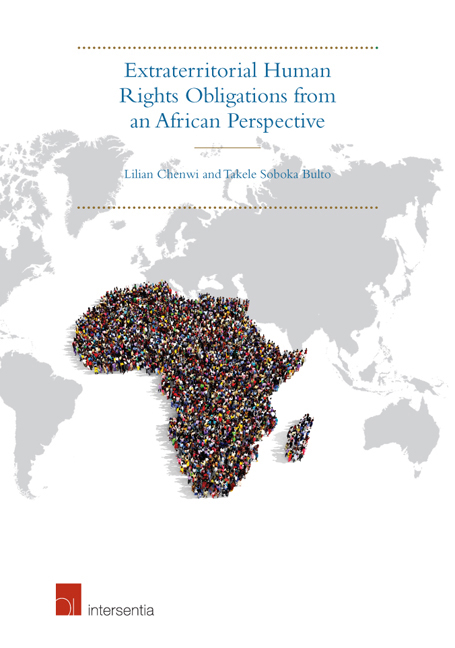Book contents
- Frontmatter
- Dedication
- Foreword
- Preface
- Contents
- List of Cases, Advisory Opinions and Other Decisions
- List of Treaties and Other Instruments
- About the Contributors
- Introduction
- Extraterritoriality in the African Regional Human Rights System from a Comparative Perspective
- Commercialisation of Educational Services and Extraterritorial Human Rights Obligations
- Extraterritorial Human Rights Obligations in the Context of Development Assistance to African States
- The Right to Food Beyond Borders: The Extraterritorial Reach of the Right to Food in Africa
- Extraterritorial Application of the Right to Water under the African System for the Protection of Human Rights
- Tortured Unity: United States–Africa Relations in Extraordinary Renditions and States’ Extraterritorial Obligations
- Indigenous Communities Displaced by Climate Change and Extraterritorial Application of States’ Obligations in Africa
- Land Grabbing, Extraterritorial Obligations and the Failure of Justice in Uganda: The Mubende Case
- Extraterritorial Obligations of Uganda for its Military's Failure to Respect and Protect Civilians in Areas of the Lord's Resistance Army Activity
- Bibliography
- Index
Extraterritorial Obligations of Uganda for its Military's Failure to Respect and Protect Civilians in Areas of the Lord's Resistance Army Activity
Published online by Cambridge University Press: 21 September 2018
- Frontmatter
- Dedication
- Foreword
- Preface
- Contents
- List of Cases, Advisory Opinions and Other Decisions
- List of Treaties and Other Instruments
- About the Contributors
- Introduction
- Extraterritoriality in the African Regional Human Rights System from a Comparative Perspective
- Commercialisation of Educational Services and Extraterritorial Human Rights Obligations
- Extraterritorial Human Rights Obligations in the Context of Development Assistance to African States
- The Right to Food Beyond Borders: The Extraterritorial Reach of the Right to Food in Africa
- Extraterritorial Application of the Right to Water under the African System for the Protection of Human Rights
- Tortured Unity: United States–Africa Relations in Extraordinary Renditions and States’ Extraterritorial Obligations
- Indigenous Communities Displaced by Climate Change and Extraterritorial Application of States’ Obligations in Africa
- Land Grabbing, Extraterritorial Obligations and the Failure of Justice in Uganda: The Mubende Case
- Extraterritorial Obligations of Uganda for its Military's Failure to Respect and Protect Civilians in Areas of the Lord's Resistance Army Activity
- Bibliography
- Index
Summary
INTRODUCTION
The Lord's Resistance Army (LRA), an armed rebel group led by Joseph Kony, a Ugandan, has been fighting against the Ugandan government since 1987. Initially confined to northern Uganda, the LRA has evolved to become a regional problem operating in the remote border areas between South Sudan, the Democratic Republic of the Congo and the Central African Republic (CAR). Throughout its history, the LRA has been responsible for gross human rights abuses, including massacres, torture, sexual violence, abductions, rape and pillage, among others. In 2005, renewed Ugandan military campaigns compelled the LRA to relocate its forces from Uganda and southern Sudan to the remote region of the Garamba National Park in north-eastern Congo and onwards to CAR. In December 2008, Uganda's armed forces, the Ugandan People's Defence Force (UPDF), the DRC's Forces Arm é es de la R é publique D é mocratique du Congo (FARDC) and the Sudan Peoples’ Liberation Army (SPLA) launched a joint military offensive code named’ Operation Lightning Thunder’ on the LRA, with the aim of putting a stop to the LRA conflict and atrocities in their territories. The offensive was carried out with military and logistical support from the United Nations (UN) Peacekeeping Mission in Congo (MONUSCO) and the United States Africa Command (AFRICOM). Reports indicate that the UPDF remains the most effective form of protection, but despite their presence, the LRA continues to commit atrocities against civilians in the region.
On 24 March 2012, the African Union (AU) announced the formation of a new Ugandan-led Regional Task Force (RTF) including troops from the CAR, the DRC and South Sudan to be based in South Sudan and CAR. The RTF comprises soldiers drawn from the four affected countries. Despite this ongoing initiative, the LRA remains scattered across the region and continues to commit human rights atrocities, including murder, maiming, abductions of civilians, including children, to be used as combatants and sexual slaves, and looting property of civilian populations in areas of the CAR, the DRC, South Darfur in the Sudan, and the disputed KafiaKingi enclave (controlled by South Sudan).
- Type
- Chapter
- Information
- Publisher: IntersentiaPrint publication year: 2018



